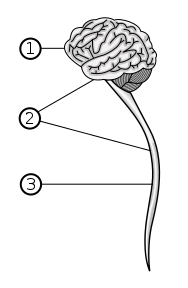 |
| The central nervous system (2) is a combination of the brain (1) and the spinal cord (3). (Photo credit: Wikipedia) |
Today we review the observations and conclusions from a workshop on the Impacts of Outdoor Air Pollution on Brain Health in 2012. Air pollution has been thought to have impacts on the central nervous system (CNS) resulting in brain inflammations, autism, lower IQ in children and Parkinson’s and Alzheimer’s diseases among others. Many neurogenerative diseases are associated with cumulative lifetime exposure resulting in premature aging. Research is called for which evaluates whether CNS disorders follow as a result of cardiovascular diseases or are independent of them
Key Quotes:
“toxicology studies have raised concerns about the potential impact of air pollution on central nervous system (CNS) outcomes including chronic brain inflammation, microglia activation, and white matter abnormalities leading to increased risk for autism spectrum disorders, lower IQ in children, neurodegenerative diseases (Parkinson’s disease, PD; Alzheimer’s disease, AD), multiple sclerosis, and stroke”
“Alterations in the CNS may have direct health consequences or play a secondary role (s) by modulating the responses of the cardiovascular, pulmonary and immune systems. Conversely, alterations in the cardiovascular, pulmonary and immune systems due to air pollution may have effects on the brain due to the production of circulating proinflammatory mediators.”
“Many neurodegenerative diseases are predicted to be the result of cumulative exposures across an entire lifetime (Carvey et al. , 2006) and aging is a well-known risk factor for the two most prevalent neurodegenerative diseases, AD and PD[Parkinson’s disease, PD; Alzheimer’s disease, AD]”
“Specific human research priorities are to:
1. Explore the effect of specific air pollution components on increased risk for neurodevelopmental disorders (e.g. autism), neurodegenerative disease (e.g. AD and PD), and mental disorders (e.g. depression) in humans.
2. Evaluate whether observed CNS effects occur downstream or independent of cardiovascular effects or cerebrovascular damage. It will be particularly useful to examine air pollutant effects in adult cohorts that are well-characterized with respect to subclinical and clinical cardiovascular and cerebrovascular disease endpoints prior to or concurrently with the assessment of brain health.
3. Utilize refined exposure estimates to examine long-term air pollution effects on the brain over the life course…, adding an air pollution exposure assessment component to existing, ongoing populations with available information on residential history or extending the scope of outcome assessment in specific longitudinal air pollution cohort studies”
“Evidence is accumulating for air pollution related CNS effects at multiple levels, including modulation of molecular/neuochemical/pathobiological pathways, neuroinflammation, neurotoxicity, and neurobehavioral changes that implicate subclinical/clinical manifestation of disease.”





No comments:
Post a Comment